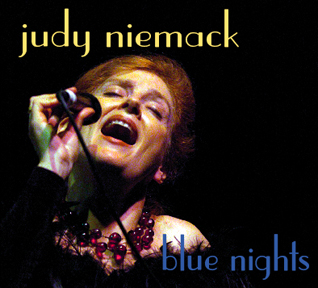 |  |
| |
Hey Judy:
So, I’m listening to this album, which with its smart concept and its unsentimental passion and its sheer professionalism would absolutely amaze me – except that I’ve learned to expect all that from everything you do. But still, I have to admit: I don’t get it.
“Blue Nights”? Sure, the blues may form the basic foundation of jazz; and even the color blue has taken on a lovely jazz mystique, in song titles and lyrics about the skies and the seven wide seas – I get all that. And yes, I know – you’ve paid some dues, convincing all those guys in all those bands that you’re every bit the musician they are. But today, what do you have to be blue about?
I mean, really. You sing like an angel, or at least like an angel who’s heard Basie and Miles: you’ve got intonation that whole choruses would kill for, and a voice that never loses its soft sheen even at hot tempos and high volume. You’re one of the few singers who actually should sing scat solos, since you think so much like a horn player. (I recall you telling me once that the reason you studied classical singing was to get “complete control” of your vocal instrument; and that when you studied improvisation with Warne Marsh, you wanted to “raise the bar” and go beyond the bebop riffing of most scatters. Well, I’ve got to say – you really have.)
I’ve never heard you not swing, though I do sometimes hear the harmonies behind the notes when you sing them – I guess that has something to do with how you maneuver around the melody, huh? – and then you write these jaw-droppingly terrific lyrics. You even make a gorgeous couple with Jeanfrançois, who must have made you even happier than usual with the arrangements on this disc.
So c’mon, really. “Blue Nights”?
I’ll say this, though: I can’t think of any other album that captures as many shades of that invaluable color. And I think you’ve done one helluva job balancing the whole spectrum: the tunes that follow strict blues structure, like Monk’s “Misterioso” and “All Blues”; the songs that alter that 12-bar structure (I’m thinking of “Moanin’,” of course, not to mention “Afro-Blue”); the ones that avoid the form entirely, but still invoke blues tonality (for instance, both the Ellington tunes – which themselves trace the breadth of blues); and the ones that capture the mood of the blues, like “Lullaby of the Leaves” or Joni Mitchell’s little beauty.
I’ll tell you what else I really love about here. I love what McNeely and Bartz bring to the table; could you find two better examples of veteran musicianship, crossing all the “t”s and dotting the “i”s whenever they play, and still sweeping up a listener with the breadth of their solos? Don Sickler doesn’t play much, but when he does, he plays a lot; you know what I mean. I’m knocked out by the guitar solos, but maybe even more by the chords Jeanfrançois chooses behind the others. And with Dennis on bass and Victor on drums, even I could swing. Well, maybe not, but it wouldn’t be their fault.
I also love the way you’ve taken two of the trickiest lines in the jazz mainstream and managed to give them the words they deserve – especially “Misterioso.” (I mean, why not make it a story about how hard it is to sing this song? Perfect.) And I’m especially keen on the arrangements. Using that African pygmy tune for an intro, alternating the beat on “Afro-Blue,” was inspired: it brings another dimension to a tune that’s been just about done to death.
“Lullaby of the Leaves” sounds so eerie; that’s because the arrangement puts the bass line in a different key from the melody, right?
I know you borrowed the arrangement on “Bluesette” from Toots Thielemans’ Brasil Project, but still, that vocal line Jeanfrançois wrote takes it up a notch. And don’t even get me started on “Tunisia”! How he managed to go from the original Afro-Cuban bop, and then make it sound even more exotic with those odd meters, and then stretch it out with the layered harmonies – and then toss in a serving of “Manteca” on the second solo break . . . . I’ll just say this: Theory 102 never sounded this hip.
For all those reasons and more, I have to agree with what you told me about this being your “big statement, taking the standards and rearranging them enough to make them mine without losing touch with the original.”
And I know you’ve been teaching a class in the blues for jazz vocalists, and that this material offers you the chance to get back to the roots – the roots of your involvement in jazz, and the roots of the music itself.
So yeah, I get all that. What I don’t get is how someone with so little reason to“sing the blues” can make them sound so damned good.
Your pal,
NEIL TESSER |
|
| | Blue |  | | Moanin’ |  |
|
| |
Judy Niemack voc, Jeanfrançois Prins g, Jim McNeely p, Dennis Irwin b, Victor Lewis drs, Gary Bartz as, ss, Don Sickler tpt, flh
All arrangements by Jeanfrançois Prins, except Afro Blue arranged by Judy Niemack. Produced by Jeanfrançois Prins and Don Sickler |
|
| |
|